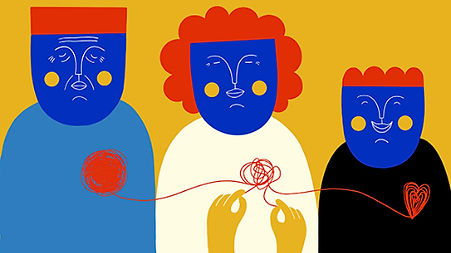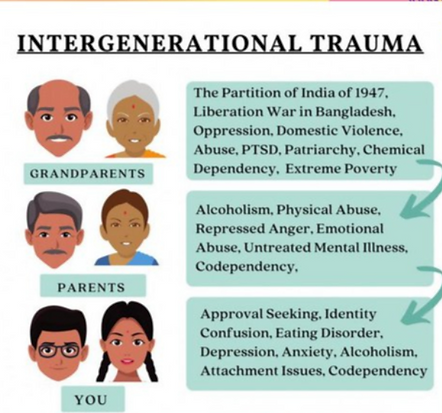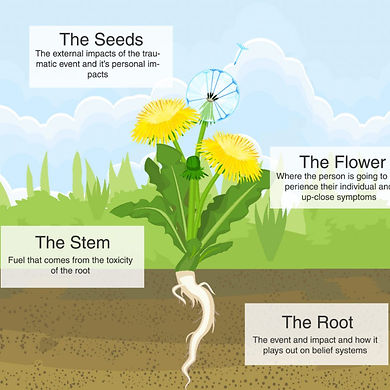Trauma doesn’t always end with the person who experienced it firsthand. Often, it reverberates through families, passing from one generation to the next. This phenomenon is known as intergenerational trauma, and its impacts can ripple across entire family systems, affecting relationships, emotional health, and overall well-being. Understanding how trauma is transmitted through generations and exploring pathways for healing is essential for breaking the cycle and fostering family health and resilience.
What is Intergenerational Trauma?

Intergenerational trauma occurs when the emotional, psychological, and sometimes physical effects of trauma are passed down from one generation to another. This transmission can happen in various ways such as genetically, behaviorally, or through family dynamics.
Research suggests that trauma can affect genes, a process called epigenetic inheritance, where trauma-related changes in gene expression are passed to offspring. While the genes themselves do not change, their expression can be altered by environmental factors such as stress and trauma, leading to heightened susceptibility to mental health disorders like anxiety, depression, and PTSD in subsequent generations. Beyond genetics, trauma is passed down through learned behaviours, coping mechanisms, and emotional patterns.
For example, a parent who has experienced trauma may struggle with emotional regulation, unintentionally modelling unhealthy coping strategies for their children. These children, in turn, may adopt these behaviours and pass them on to their children, perpetuating the cycle.
Signs of Intergenerational Trauma
Intergenerational trauma can manifest in various ways across family systems:

• Emotional Dysregulation: Families affected by trauma may have difficulty expressing or managing emotions. Anger, sadness, and anxiety may dominate family interactions, and emotional closeness can become difficult to achieve.
• Attachment Issues: Trauma can severely impact the ability to form secure attachments, leading to difficulties in relationships within the family. Children may grow up feeling emotionally disconnected from their caregivers, which can result in attachment styles that continue into adulthood.
• Behavioral Patterns: Maladaptive behaviours like substance abuse, aggression, or withdrawal may be passed down through generations as coping mechanisms for dealing with unresolved trauma.
• Mental Health Disorders: Anxiety, depression, and PTSD are often found in families affected by intergenerational trauma, with patterns of these conditions showing up across multiple generations.
Understanding the Roots of Intergenerational Trauma

Intergenerational trauma can arise from various sources, including:
• Historical or Cultural Trauma: Large-scale traumatic events like wars, colonization, slavery, genocide, and forced migration can have lasting effects on families, particularly in marginalized or oppressed communities. The trauma endured by one generation can leave deep scars on subsequent generations, who may continue to bear the emotional and psychological burden.
• Family Trauma: Experiences such as child abuse, neglect, domestic violence, and parental loss can create an environment of instability that shapes how future generations experience and process emotional pain.
One famous example is the trauma experienced by Holocaust survivors, which has been extensively studied for its intergenerational effects. Descendants of survivors have been found to carry heightened levels of stress, anxiety, and depression, even when they did not directly experience the events themselves.
Pathways for Family Healing
Although intergenerational trauma can seem overwhelming, there are ways to heal from it and prevent its transmission to future generations. Family therapy, individual counselling, and emotionally focused therapy (EFT) offer effective methods for addressing these deep-seated wounds.
1. Trauma-Focused Family Therapy

Family therapy can be an essential tool for healing intergenerational trauma, as it allows family members to confront the patterns that have developed over time. Therapies like Emotionally Focused Family Therapy (EFFT) focus on strengthening emotional bonds and helping family members process difficult emotions together. The goal is to create a safe space for open communication, where trauma can be acknowledged and worked through collectively.
Example: In a family where emotional withdrawal is common due to unresolved trauma, family therapy can encourage open discussions about feelings, breaking the cycle of emotional isolation. By fostering healthier emotional exchanges, family members can begin to form more secure attachments with each other.
2. Breaking Behavioral Patterns

Recognizing the behavioural patterns that perpetuate trauma is critical for healing. Families can work on identifying unhealthy coping mechanisms such as substance abuse, aggression, or emotional withdrawal and replacing them with healthier alternatives, such as mindfulness, emotional regulation techniques, and active listening skills.
3. Individual Trauma Therapy

For some, individual therapy is a crucial step in processing personal trauma before engaging in family-based approaches. Therapies such as Eye Movement Desensitization and Reprocessing (EMDR) and Cognitive-behavioral therapy (CBT) are effective in helping individuals confront and heal from past trauma. These therapies can help a person become more emotionally available and resilient, positively influencing their family dynamics.
4. Cultural Healing and Reconnection

For communities affected by cultural or historical trauma, reconnecting with cultural practices, traditions, and community resources can provide a sense of grounding and identity. For example, Indigenous communities impacted by colonialism may find healing in returning to traditional ceremonies, storytelling, and communal gatherings that promote collective healing.
Breaking the Cycle: Healing for Future Generations
Healing from intergenerational trauma is not only about addressing past pain but also about breaking the cycle for future generations. Families who commit to healing can offer their children healthier emotional environments and more secure attachments, ensuring that trauma is not perpetuated.
Parents and caregivers who address their trauma through therapy, self-awareness, and emotional growth provide a positive example for their children. By doing this, they create a legacy of resilience rather than pain, allowing future generations to thrive emotionally and psychologically.
If you suspect that intergenerational trauma is affecting your family, healing is possible. As a Trauma Therapist, I specialize in helping families break the cycle of trauma and strengthen their emotional connections.
Contact me today to begin your journey toward healing and building a more resilient family.
Together, we can create a healthier, emotionally connected future for you and your loved ones!



